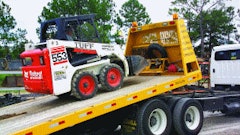
Today's clients are savvier than ever before and use a variety of methods to determine if a construction professional is right for a project.
Certification programs have become one of the most prominent tools for clients to verify the experience and knowledge of professionals. In fact, some are requiring that professionals be certified to bid on a project. Committing to certification can set your firm apart from the competition by having third-party verification of knowledge and become one of your greatest marketing tools.
In response to demand from the industry, the Tilt-Up Concrete Association — in concert with the American Concrete Institute — developed the Tilt-Up Supervisor Certification program through ACI's C-650 Committee to maintain industry growth and professionalism.
"The use of Tilt-Up grew 23 percent in 2004 and almost 215 million sq. ft. of wall panels were constructed using the method," says TCA executive director Ed Sauter. "This kind of growth emphasizes the need for professional standards to ensure consistency and quality as the Tilt-Up construction method spreads."
Launched in 1999, the Tilt-Up Certification program was an idea that TCA began developing in 1996 before partnering with ACI. The TCA Board of Directors realized that a program qualifying on-site personnel would aid in expanding the Tilt-Up industry into new markets. The partnership between TCA and ACI was a natural fit — TCA had the expertise to develop examination questions and reference materials, and ACI had the experience to administer and oversee the certification process.
ACI offers two different types of certification levels. First, full certification as a Tilt-Up Supervisor requires a passing score on the exam (70 percent) and a minimum of five years (7,500 hours) of verifiable construction experience, of which at least three years (4,500 hours) must be as a tilt-up supervisor or assistant supervisor, as well as a demonstrated proficiency in and an understanding of overall on-site administrative and technical management for producing tilt-up projects. Those lacking the sufficient work experience to qualify as a Tilt-Up Supervisor become certified as a Tilt-Up Technician by successful completion of the same written examination. The examination consists of 80 multiple-choice questions. Currently, there are 86 certified Tilt-Up Supervisors and 235 certified Tilt-Up Technicians in Canada and the United States.
Those certified will hold the status for five years before having to recertify by successfully completing the current requirements for certification. A certified Technician is able to upgrade to Supervisor status within a five-year time period of their certification through the completion of the necessary work experience.
Competitive advantage
Companies throughout the industry have learned the value that certification can bring to their firm. DIVCON, Inc., of Spokane, Wash., is continually looking for ways to differentiate themselves from the competition. One method the company has employed is to commit to getting its field employees certified in the TCA/ACI program.
"The certification program really helps our team get a broader picture of the tilt-up process," says Shane Miller, vice president, at DIVCON. "We have noticed that once they are through our training and get ACI/TCA certified, everyone cares about the smallest of details." At this point, more than 75 percent of DIVCON's field personnel are certified.
To prepare their team for the exam, Miller conducts a series of classes five weeks before the test. He uses the ACI Certification Manual as a study guide and reference tool. During the course, participants break down the manual and engage in discussion about the topics.
"The seminars have been a great tool for our firm for opening debate and creating a forum for information exchange," said Miller. "In fact, the sessions have become so popular that employees who are already certified attend as a refresher or to contribute to the discussion."
Further, anyone sitting for the exam attends the TCA-sponsored Tilt-Up Supervisor Training for Certification seminar — a course designed to prepare attendees for the exam. The seminar covers a broad range of topics from planning and safety through erection, bracing and finishing.
Miller credits the certification exam and associated seminars with educating his team about the idiosyncrasies of tilt-up. He also noted the exam serves as confirmation that they know what they are doing — both internally and externally.
The benefits of the program extend north of the border to Canada as well. For example, a school construction project in Windsor, Nova Scotia, demonstrated the competitive edge that certification can give your company. The Windsor West Hants High School was the first project that prequalified bids from contractors whose staff had passed the TCA/ACI Tilt-Up Technician and Supervisor Certification course.
Resources for success
As professionals begin preparing for the next public offering of the certification exam, to be held at the World of Concrete in January, understanding where to find the best study materials is crucial. The first recommended step involves visiting ACI's website at www.concrete.org. In addition to a program overview, forms and exam preparation instructions are available. Then contact TCA to determine the schedule for upcoming training, review, or testing sessions as well as to order the recommended study materials. The Supervisor and Technician Reference Guide CP-50 can be purchased on TCA's website — www.tilt-up.org — for $80 ($50 for TCA members), plus shipping and handling. The guide includes all the reference materials needed to study for the Tilt-Up Supervisor Certification exam. Beyond being a study guide, the manual also serves as an excellent reference tool for contractors.
Future of certification
With more than 700 certified Tilt-Up Supervisors and Technicians, it is clear that certification is a method for many contractors to differentiate themselves from their competition. As of June 1, 2005, 179 Supervisor and 538 Technician certifications have been issued, for a total of 717 total certifications. Of those 717 certifications, 121 were issued in Canada.
"The rise in the number of certified personnel is a direct response to the growth in use of the method," says Sauter. "This certification program sets clear professional standards that ensure consistency and quality in tilt-up construction throughout North America."
"Tilt-Up Supervisor Training Seminars" and "Tilt-Up Certification Exams" are currently scheduled to take place at the next TCA sponsored events. These include the World of Concrete (Jan. 17-20, 2006), co-sponsored by the TCA in Las Vegas with the seminar on Jan. 16 and the exam on Jan. 18 and the TCA Spring Regional Meetings (May 4-6, 2006) in Charleston, S.C., on May 5. More information on these events can be found by visiting www.tilt-up.org.
Jim Baty is technical director of the Tilt-Up Concrete Association. This is the sixth article in a year-long series on the benefits of tilt-up construction presented by the TCA and Concrete Concepts. For more information about TCA, visit www.tilt-up.org or call (319) 895-6911.






























